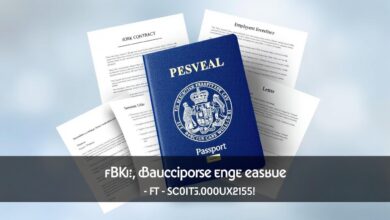Visa Sponsorship for Nursing Jobs in the Netherlands: Benefits and Advantages You Need to Know
The Netherlands is becoming a top choice for skilled nurses, especially from Nigeria.
Anúncios
The Nursing Netherlands Visa Sponsorship is key to this trend. It helps foreign healthcare workers find jobs in a growing field.
Employers in the Netherlands are looking to sponsor nurses. This support helps them grow professionally. It’s a great opportunity for those seeking international nursing jobs.
This visa sponsorship opens doors to better career chances. It lets nurses work in a healthcare system that values diversity and innovation. Nigerian nurses can expect a supportive work environment that encourages growth.
Understanding Nursing Netherlands Visa Sponsorship
Visa sponsorship is when an employer helps a foreign worker get a visa to live and work in their country. For nurses, this is key to starting a career in the Netherlands. Knowing the visa requirements is crucial for those on this journey.
You will remain on the current site
What is Visa Sponsorship?
Visa sponsorship lets a foreign nurse get help from a Dutch employer to apply for a work visa. This makes the immigration process easier for the nurse. It also means the employer can offer specific job opportunities.
Importance for Foreign Nurses
For nurses from abroad, getting a sponsored visa is essential. It’s a way to find work and join the Dutch healthcare system. This support shows the employer’s commitment to hiring skilled nurses and helps those who might struggle with immigration alone.
Overview of Nursing in the Netherlands
The Netherlands has a strong healthcare system with top-notch hospitals and facilities. There’s a big need for skilled nursing professionals, especially those with international experience. Many Dutch healthcare places are looking to hire nurses from abroad, making it important to know the visa requirements.
Why Choose the Netherlands for Nursing Careers
The Netherlands is a great place for those wanting to grow their nursing career. It has a high need for healthcare workers. This makes it a top choice for nurses from abroad. Here are some reasons why starting or advancing your nursing career in the Netherlands is a good idea.
High Demand for Nurses
The healthcare sector in the Netherlands is growing fast. This is because of an aging population and new healthcare policies. Hospitals, nursing homes, and clinics are looking for skilled nurses. This means there are many job openings for nurses in the Netherlands.
Competitive Salaries and Benefits
Nurses in the Netherlands get good pay and benefits. These include health insurance, time off, and pension plans. The pay and benefits help nurses do well financially while they work in the Netherlands.
Quality of Life and Work Environment
The Netherlands is known for its great quality of life. It has a good balance between work and personal life. The country also has great public services, cultural diversity, and supports immigrants. All these things make it a great place for nurses to work and live.
Eligibility Criteria for Visa Sponsorship
Foreign nurses dreaming of working in the Netherlands need to know about visa sponsorship rules. There are several important steps to follow. These steps help decide if you can get a visa.
Educational Qualifications
You must have a nursing degree from a recognized school. This degree should match Dutch standards. It’s important to show proof of your studies and clinical experience.
Language Proficiency Requirements
Speaking Dutch well is key in healthcare. Nurses need to talk and understand medical terms in Dutch. Many employers ask for a language test to make sure nurses can work well with patients and colleagues.
Licensing and Credential Evaluation
To work as a nurse in the Netherlands, you must get a license. This includes checking if your nursing degree is recognized in the Netherlands. The Dutch healthcare authority checks each application. This ensures foreign nurses can work safely and well.
Application Process for Nursing Netherlands Visa
Foreign nurses dreaming of a career in the Netherlands need to know about visa sponsorship. This process has several steps, needed documents, and a timeline. It’s all about getting a visa for nurses in the Netherlands.
Step-by-Step Application Guide
The first step is getting a job offer from a Dutch healthcare employer. Then, you need to gather all the required documents. These include:
- Proof of nursing qualifications
- Language proficiency certifications, typically in Dutch or English
- A formal job offer from a Dutch healthcare institution
- Passport copies and additional identification
- Any relevant residency or work authorization documents
Required Documentation
Getting your documents right is key to getting a visa for nursing in the Netherlands. Each document must be correct and verified. Here’s what you need:
| Document Type | Description | Format |
|---|---|---|
| Nursing Diploma | Verified copy of diploma or degree in nursing | PDF or physical copy |
| Language Proficiency | Proof of language skills (Dutch or English) | Certification or test results |
| Job Offer | Formal offer letter from a Dutch employer | Signed document |
| Passport | Valid passport for identification | Physical copy |
| Residency Documents | Proof of residence if applicable | PDF or physical copy |
Timeline for Processing
The time it takes to process a visa application varies. It depends on how complete your application is and government processes. Here’s what you can expect:
- Document preparation: 1 to 2 months
- Submission of application: 1 week
- Processing time by Dutch authorities: 2 to 4 months
- Finalization and notification: 1 to 2 weeks
Getting a visa for nursing in the Netherlands requires careful planning and preparation. With the right documents and approach, you can increase your chances of success.
Financial Considerations for Moving to the Netherlands
When you move to the Netherlands for nursing jobs, knowing about money matters is key. The cost of living, what you can earn, and support available all affect your life quality. These factors are crucial for a good experience in the country.
Cost of Living in the Netherlands
The cost of living changes in different Dutch cities. Amsterdam is the priciest, while Rotterdam, Utrecht, and The Hague are cheaper. Here’s a look at typical monthly costs:
| City | Rent (1-bedroom) | Groceries | Transportation | Healthcare (Insurance) |
|---|---|---|---|---|
| Amsterdam | €1,500 | €300 | €100 | €140 |
| Rotterdam | €1,200 | €250 | €90 | €130 |
| Utrecht | €1,300 | €270 | €95 | €135 |
| The Hague | €1,250 | €260 | €85 | €120 |
Salary Expectations for Nurses
Nurses in the Netherlands earn good salaries. A registered nurse makes about €2,500 to €3,700 a month. This depends on their experience and specialty. Knowing these salary ranges helps you plan your finances for nursing jobs here.
Financial Support and Benefits
Employers in the Netherlands help foreign nurses financially. They might cover moving costs and help with housing. Health insurance is needed, and employers often help pay for it. These benefits are important to consider when thinking about nursing jobs here.
Language and Cultural Integration
For nurses in the Netherlands, adapting to the culture is key. It helps them communicate well and build strong relationships. Learning Dutch is a big step in this process. It makes nurses more confident in their work and better at understanding patients’ needs.
Importance of Learning Dutch
Learning Dutch is crucial for foreign nurses. Good communication is vital in healthcare. Knowing medical terms in Dutch helps nurses work better with their team and patients.
This builds trust and makes the work environment better. It also helps nurses enjoy life outside work, like shopping and socializing. Knowing the language makes it easier to settle in and adapt to the culture.
Resources for Language Learning
There are many ways for nurses to learn Dutch. Courses for healthcare workers teach the right words and phrases. Online tools like Duolingo and Babbel let nurses learn anytime.
Local community centers also have language classes and groups. These offer real-life practice and help nurses meet new people. Talking with native speakers speeds up learning.
Cultural Adaptation Support
Many groups help nurses get used to Dutch life. Community events and cultural programs are great for learning about local customs. These programs give insights into daily life, healthcare, and social norms.
By joining these groups, nurses can make a smoother transition to the Netherlands. It helps them feel more at home and connected to the community.
Rights and Responsibilities of Sponsored Nurses
The visa sponsorship process for nurses in the Netherlands has specific rights and duties. These are key for a fair and positive work environment. It’s important for foreign nurses to know these rights to smoothly start their new roles.
The framework highlights the employment rights of nurses in the Netherlands. It also shows the duties of employers and the protections nurses have during sponsorship.
Employment Rights in the Netherlands
Nurses in the Netherlands have many employment rights. These rights protect their well-being and ensure fair treatment at work. Some of these rights include:
- Non-discrimination: Nurses can’t be treated unfairly because of race, gender, or nationality.
- Safe working conditions: Employers must ensure a safe and healthy work environment.
- Fair compensation: Nurses should get salaries that match their skills and experience.
Responsibility of Employers
Employers in the Netherlands have a big role in protecting nurses’ rights. They must:
- Provide support: Employers should help nurses adjust to their roles and the healthcare system.
- Ensure compliance: Employers must handle work permits and visa obligations well.
- Communicate clearly: Employers should clearly explain job expectations for a good work experience.
Rights During the Sponsorship Process
Nurses should know their rights during the visa sponsorship process. Important points include:
- Transparency: Nurses have the right to clear information about their sponsorship terms.
- Protection against abuse: Legal safeguards protect nurses from exploitation or mistreatment.
- Access to support: Sponsored nurses can get help if they face challenges during their transition.
Networking and Professional Development Opportunities
Building a strong network is key for nurses in the Netherlands. It helps them share knowledge, exchange ideas, and find new career paths. This section looks at ways to network, keep learning, and join professional groups.
Connecting with Other Healthcare Professionals
Going to conferences, workshops, and seminars is great for networking. Nurses meet peers and leaders, learning about new practices and trends. Social media, like LinkedIn, is also good for making connections and staying in touch.
Continuing Education and Specializations
For nurses, ongoing learning is vital. Many places in the Netherlands offer special programs and courses. These focus on areas like pediatric care, emergency nursing, or gerontology. This learning not only improves skills but also opens up more career options.
Professional Organizations for Nurses
Joining professional groups helps nurses grow in their careers. These groups offer resources, mentorship, and support. The Dutch Nursing Association and others focused on nursing specialties are examples. Being a member gives access to important info for professional growth and career satisfaction.
Testimonials from Nurses in the Netherlands
Nurses moving to the Netherlands share amazing changes in their lives. Their stories, especially from Nigerian nurses, show both challenges and triumphs. These tales offer a glimpse into a rewarding journey abroad.
Experiences of Nigerian Nurses
Nigerian nurses talk about their unique experiences in the Dutch healthcare system. They feel excited to start anew, despite cultural differences. They also face the challenge of learning Dutch for both work and daily life.
Bridging the gap through language skills is key for better patient care and work relationships.
Challenges and Success Stories
The journey is not easy. Nurses face challenges like adjusting to new medical protocols and understanding the Dutch healthcare system. But, many success stories show their resilience and determination.
These challenges help nurses grow personally and professionally. They become more confident and skilled, which improves their job performance.
Impact on Personal and Professional Growth
Nurses say their experiences in the Netherlands have broadened their views. They learn advanced nursing practices and work in collaborative environments. This makes them more competent and skilled.
Testimonials highlight the long-term benefits of professional connections and certifications. These improve career prospects both locally and internationally.
| Nurse Origin | Years in Netherlands | Key Challenges | Achievements |
|---|---|---|---|
| Nigeria | 2 | Language barrier, cultural adaptation | Specialized in geriatric care, fluent in Dutch |
| Nigeria | 1 | Different medical standards | Successfully led a community health project |
| Nigeria | 3 | Homesickness | Mentorship program for new nurses |
Future of Nursing and Visa Sponsorship in the Netherlands
The healthcare world is changing fast, bringing new chances and hurdles for nurses in the Netherlands. New tech like telemedicine and better patient care models are on the rise. These changes mean more jobs for skilled nurses, as they are needed to keep up with these advancements.
Trends in the Healthcare Sector
The healthcare in the Netherlands is moving towards more team-based and patient-focused care. This change means nurses need a wide range of skills and specialties. So, foreign nurses will find many job opportunities, making the future of nursing in the Netherlands look bright.
Potential Changes in Visa Policies
As more healthcare workers are needed, visa rules might get easier for foreign nurses. Talks among lawmakers aim to make it simpler for skilled workers to come to the Netherlands. This could help more nurses join the Dutch healthcare system, making it a better place to work.
Long-Term Career Prospects for Foreign Nurses
Foreign nurses in the Netherlands have a promising future ahead. The healthcare sector is growing, making the Netherlands a top choice for nurses worldwide. With good pay and a strong healthcare system, these nurses can look forward to rewarding careers, helping the nursing field in the Netherlands thrive.
FAQ
What is visa sponsorship for nursing jobs in the Netherlands?
Visa sponsorship for nursing jobs in the Netherlands means an employer helps a foreign nurse get a visa. This lets them work legally in the country.
What are the benefits of working as a nurse in the Netherlands?
Nurses in the Netherlands get good pay and a high quality of life. They also work in a top-notch healthcare system. This system values diversity and innovation.
What are the eligibility criteria for obtaining visa sponsorship in the Netherlands for nurses?
To get visa sponsorship, nurses need a recognized nursing degree and to speak Dutch. They also have to pass a licensing and credential check. This ensures their qualifications meet local standards.
How can one apply for a nursing job in the Netherlands?
First, find a job in Dutch healthcare. Then, gather all needed documents. Follow the steps to apply for visa sponsorship.
Are there language requirements for foreign nurses in the Netherlands?
Yes, knowing Dutch is key for work and daily life. Nursing candidates must show they can speak Dutch during their application.
What kinds of financial support are available for foreign nurses moving to the Netherlands?
Employers often help with moving costs, health insurance, and more. This makes settling in a new country easier.
What rights do sponsored nurses have while working in the Netherlands?
Sponsored nurses get fair treatment and support from their employers. They also have rights during the visa process to ensure they’re informed and protected.
What are the cultural integration challenges for foreign nurses in the Netherlands?
Nurses face challenges like learning the Dutch language and adjusting to a new healthcare system. But, there are resources to help with this transition.
How can nurses in the Netherlands engage in professional development?
Nurses can grow by attending conferences, taking continuing education, and joining professional groups. These offer valuable resources and support.
What future trends should foreign nurses in the Netherlands be aware of?
Nurses should keep up with healthcare tech, visa policy changes, and new patient care models. These trends can shape their careers in the Netherlands.
Published on: 11 de April de 2025

Arturo González
Arturo González is the founder and lead writer of DebxCred.com, a platform created to help people make smarter and more informed financial decisions. With a degree in Business Administration and a specialization in Financial Marketing, Arturo built a solid corporate background before deciding to share his knowledge in a practical, easy-to-understand way.
Driven by a genuine passion for finance and education, Arturo turned DebxCred.com into a trusted source for detailed reviews of financial products, digital banking tools, and practical financial education — empowering readers to take control of their money with confidence.
In his free time, Arturo finds balance and inspiration while surfing — a hobby that reflects his calm yet determined approach to helping others build a healthier and more prosperous financial life.






